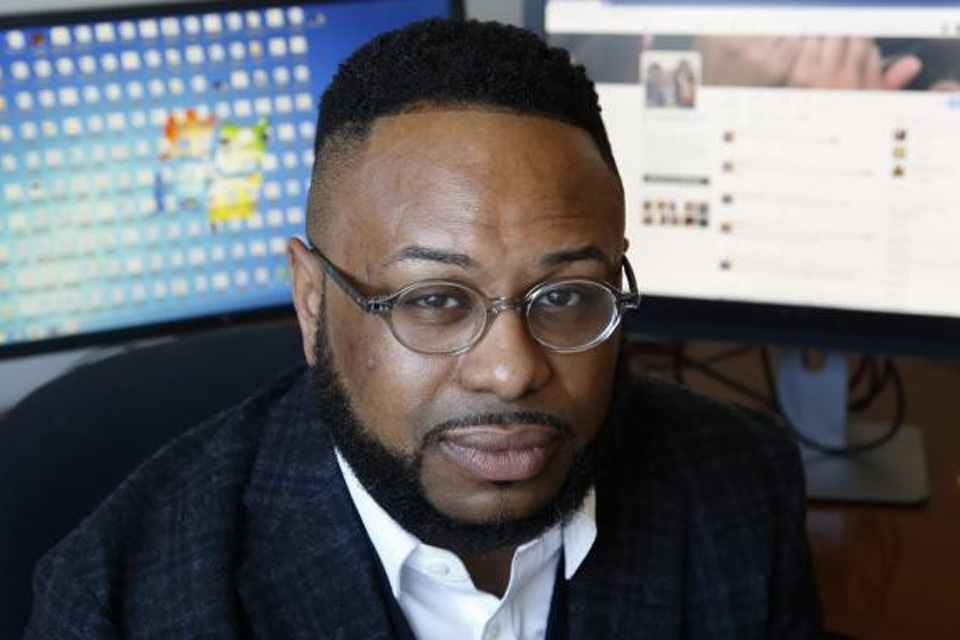

Desmond Upton Patton, an associate professor of social work and sociology, brings years of experience at the intersection of computation, social science, and cultural sensitivity to his new role as associate director of diversity, equity, and inclusion for the Data Science Institute (DSI). His current and upcoming projects will promote research and researchers that address issues of racial equity and fairness in data science, such as those that manifest in training data, machine learning algorithms and models, and automated decision making. He considers himself “a social worker who has an interest in technology.”
Patton’s academic journey began with a motivation to address youth violence, especially gun violence, by exploring how young people navigate safe and unsafe spaces. This led to the realization that online spaces were also part of the equation. Social media could be understood as a neighborhood or community where young people were living—and performing—their lives. Today, his research combines qualitative and computational data analysis to examine how and why youth and gang violence, trauma, grief, and identity are expressed on social media, and the real-world impact these expressions have on the well-being of low-income youth of color.
As founder of SAFElab, a research initiative focused on examining the ways in which youth of color navigate violence on and offline, Patton leverages approaches that combine social work methods with data science. SAFElab’s interdisciplinary researchers engage in qualitative analysis and natural language processing methods to examine social media posts in order to better understand pathways to violence and develop possible interventions.
A key finding of Patton’s research emerged in 2018, when his analysis of tweets by gang-involved Chicago youth found a connection between expressions of loss and aggression online. In fact, Patton and his fellow researchers discovered a regular pattern of grief leading to aggression, with powerful implications for intervention. His findings highlight the potential of data analysis as a tool for identifying points of need in a timely manner, and for violence prevention and prediction.
In collaboration with Kathleen McKeown, Henry and Gertrude Rothschild Professor of Computer Science and founding director of DSI, Patton and his SAFELab colleagues are developing tools and AI techniques to study the language and images in social media posts at scale. The challenge of analyzing and coding gang-related tweets has revealed the need for cultural sensitivity in data analysis. Patton and his team discovered that existing data science techniques were not equipped to analyze the cultural nuances of language used among predominantly Black and Hispanic youth. “The tools we have didn’t work on the vernacular that I was working with,” Patton explained. “We have had to create new ontologies and dictionaries. We have brought in young people as experiential experts to help interpret data and give feedback.”
Being conscious of how this research is conducted, and how texts are coded and used, is part of the research journey. In order to address any ethical issues, Patton and his team created a Contextual Analysis of Social Media (CASM) approach to center culture, context. and inclusion in data analysis. CASM is a web-based annotation system that promotes thought and rigor to the process of applying an analytical label to texts used in machine learning. After the seven-step CASM process, researchers produce labels that are more robust, accurate, and useful.
Patton envisions a multistep process through which DSI will factor considerations of race and bias into all academic work, and develop the guidelines necessary to help practitioners with this task. His future projects include a lecture series and fellowship focused on race and data science, as well as a mentorship program to advance a more inclusive student body and faculty. “My hope is that Columbia University becomes a bastion of innovative critical discussions around race and data science,” Patton said. “It’s a tall order—we are nowhere near that—but we have a lot of talented folks, and we’re in one of the most diverse cities in the world. I believe we can do it if we choose to do so.”
— Karina Alexanyan, Ph.D.